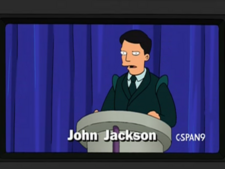 I invite you to follow me down the rabbit hole to an alternate future. The date is January 20, 2013. John Q. Republican, having vanquished Barack Obama the previous November, has just taken the oath of office. An ideal combination of neatly-coiffed hair and poll-tested doublethink, a perfect mix of charm and vitriol, John has clawed his way to power by achieving that rare feat of uniting the perpetually warring Republican clans: the socially conservative, God-fearing theocons; the Risk-playing neocons, belli-vangelists of truth, justice, and the American way; and the penny-pinching paleocons.
I invite you to follow me down the rabbit hole to an alternate future. The date is January 20, 2013. John Q. Republican, having vanquished Barack Obama the previous November, has just taken the oath of office. An ideal combination of neatly-coiffed hair and poll-tested doublethink, a perfect mix of charm and vitriol, John has clawed his way to power by achieving that rare feat of uniting the perpetually warring Republican clans: the socially conservative, God-fearing theocons; the Risk-playing neocons, belli-vangelists of truth, justice, and the American way; and the penny-pinching paleocons.He’s done that in part by pledging himself to the defeat of their common foe: the dreaded Obamacare. But now in office, he finds that tossing a law off the books is more difficult than the campaign rhetoric would suggest. And he’s begun to feel the responsibility to govern. So how does he make the best of a bad situation? How can conservative President John Q. Republican pursue a conservative health policy agenda with the Affordable Care Act in place?
He's in luck. Far from being the ideological piece of legislation it's often portrayed as, the ACA is a pragmatic toolbox containing goodies even conservatives can use to advance their favorite ideas. In the next few posts I'll sketch out a User's Manual for the modern conservative looking to discover what the ACA can do for him: actions John Q. Republican could choose to take and even some outcomes likely to naturally unfold from the law. I think I'll be using policy positions from real-world presidential candidates and others just to keep us grounded. The exercise will give us a good opportunity to explore some interesting policy while we're at it.
So stifle those yawns and get poised on the edge of your seat.